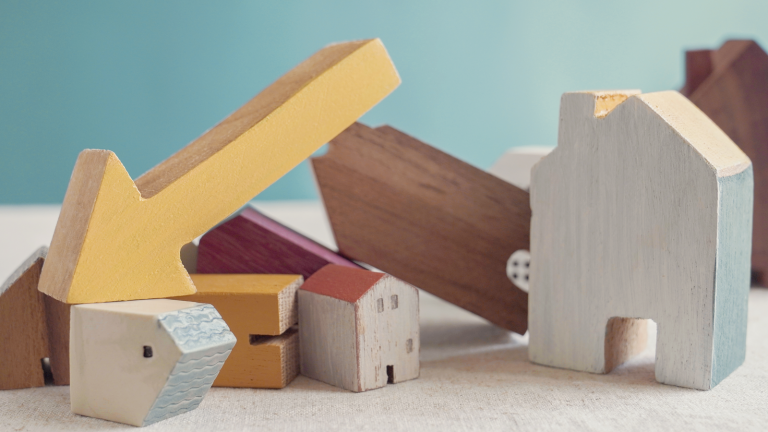Evidence is mounting that the U.S. housing market may be deteriorating faster than it did in the 2008 recession. This has sparked speculation that home prices may be in for a more brutal pullback than many economists projected.
With 30-year fixed mortgage rates trending over 6% for the first time since 2008, demand for homes is down substantially from last year’s peak. Data from the National Association of Realtors (NAR) shows July home sales fell nearly 20% year-over-year. Furthermore, rent prices are up almost 30% from last year, primarily attributed to single-family rentals. This reflects the fact that many would-be home-buying families are opting to rent instead of committing to a down payment on a house.
It’s not just demand, however. In July, the U.S. recorded a 10.4-month supply of new houses, the highest level since 2009. Housing starts over the past few years have also substantially outpaced household formation. That is to say, more homes are being built than there are households to buy them.
Perhaps most startling, however, is the price-to-income (PI) ratios on homes. Using a median new home price of $438,067 and average hourly earnings of $27.32 puts the PI ratio at 16,035. For context, this is the highest the figure has been since the Great Recession, when it was 14,923. Relative to wages, home prices are beyond reach for a majority of working Americans, meaning the demand for homes is unlikely to return without a substantial correction to real estate prices.
Clearly the real estate market is backtracking some from its red-hot growth the past few years.
2022 Housing Market Showing Shades of 2008
Depending on who you ask, the housing market may be subject to a widespread, debilitating recession akin to the 2008 housing crash, a more mild pullback or a simple slow in home price growth. In the Federal Reserve’s minutes meeting on Sept. 21, Fed Chair Jerome Powell warned of a “difficult housing correction.”
“For the longer term, what we need is supply and demand to get better aligned so that housing prices go up at a reasonable level and at a reasonable pace and that people can afford houses again,” Powell said.
Recent data shows this fall in prices has already begun. The S&P CoreLogic Case-Shiller index, a measure of prices in 20 major cities, fell to a 15.8% increase in July. Meanwhile, the Zillow Home Value Index is still up from the same month last year, but fell on a monthly basis for the first time since 2012. That marks one of the quickest reversals in growth in the history of the index.
This has come in conjunction with substantial month-over-month declines in several regional housing markets. Seattle, San Francisco and San Diego home values each fell between 4% and 5% in July.
Adding to the general downward forces on home prices is a return of housing inventory. July’s housing supply level was previously only reached during the peak of the 2008 housing crisis. The limited supply of homes for sale has, for many economists, been one of the major barriers to a true housing crash.
A return to housing inventory may reflect that some homeowners are panic selling in fear of losing value on their property — or out of economic necessity. Either way, basic economics tells us low demand and high supply is a recipe for falling prices.
Experts Weigh in on Severity of Housing Cooldown
While evidence continues to mount that the housing market may be in for a bout of turbulence, not everyone agrees on just how bad things could get.
Moody’s chief economist Mark Zandi, one of the foremost leaders in the field, believes U.S. home prices are in for correction, falling between 0% and 5% over the next year assuming the U.S. avoids a wider recession. That in itself implies the U.S. isn’t in a recession currently, which remains a point of contention among economists.
With that said, a 5% correction is far from the bubble burst of 2008. “Crash is what happened back in the financial crisis — that was a crash,” Zandi told MarketWatch earlier this month. “That’s not what we’re gonna have here.”
Redfin Chief Economist Daryl Fairweather is even more optimistic, telling The Escape Home he expects prices to fall 5% if the country does plunge into a “severe recession.”
On the other hand, Aaron Brown, the former Managing Directory and Head of Financial Market Research at AQR Capital Management believes a crash remains a distinct possibility. In a recent Washington Post analysis, Brown makes a fairly well-balanced case that U.S. housing may be in a bubble:
“Home valuations increased as rates increased, just as in the housing bubble. Perhaps that is turning around now, as housing prices are beginning to decline (typically before we see large price declines we see softening markets — fewer buyers and sellers, longer delays between listing and sales — as have been happening in the last few months) and the Fed is raising rates. But looking at the data so far, it looks like a bubble.”
Now, Brown also claims he’s “still not panicking about a housing crash.” Predicting a rise in rent will keep home prices afloat as necessary. Maybe he’s right, maybe he’s wrong. Either way, it’s worth pointing out that apartment rent fell 0.1% in the U.S between July and August, the first drop in almost two years.
On the date of publication, Shrey Dua did not hold (either directly or indirectly) any positions in the securities mentioned in this article. The opinions expressed in this article are those of the writer, subject to the InvestorPlace.com Publishing Guidelines.

